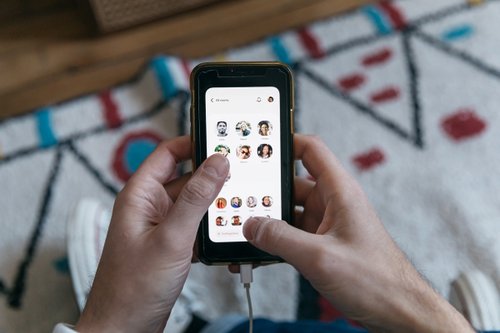How to get on the radar of people you admire
Mar 10, 2022
5 mins


Writer
So much about succeeding in your career or getting your dream job comes down to who you know. Talent and hard work are essential, of course, but if you can get yourself noticed by the right people and make a good impression, there’s a chance they will think of you when an opportunity opens up, or be willing to help you down the line.
Karen Wickre, an editor, writer and communicator with more than 30 years’ experience in the tech industry, knows how important this is, especially as the gig economy and job fluidity redefine the world of work. A few years ago, Wickre wrote an article for Wired about the secrets to building a mighty network, which she later turned into a book, Taking the Work Out of Networking: Your Guide to Making and Keeping Great Connections.
“I have always been someone who has kept in touch with people by nature, back in the days when the internet didn’t exist,” Wickre says from her home in San Francisco. “It’s kind of human nature to say, ‘Oh, I know who you need to meet.’ I’ve long been a connector between people and I’m happy to make introductions where I can. And it’s not at all just about job hunting: you may want to learn about a particular company or business.”
Whether you’re seeking advice from someone who has “made it” or putting feelers out for a career change, here are a few helpful tips from Wickre on how to network successfully.
Think about why you want to reach out
First of all, reflect on why you want to connect and what you want to ask this person, says Wickre. “What I ask people who want me to introduce them to someone is to tell me more about why they want to talk to them,” she says. “Whether it’s to learn more about them, to invite them to speak at a conference, to find out about an internship for their kid—whatever it is, I ask them to send me a paragraph.”
The point is that rather than just wanting to meet someone you admire, you need to know exactly what you’re looking for. This will also give the other person an idea of how they can help. “It can’t just be ‘I want to be in your network’ in generic LinkedIn language. That’s not a good enough reason,” says Wickre. “The point is not to add followers to your account. I don’t think that works very well. It’s much more effective to send a specific request.”
Choose the right way to contact them
When it comes to reaching out, getting an introduction is ideal. But unless you’re already very well connected, that won’t be an option.
Social media has made connecting easier than ever, but it’s important to choose the right platform. Make sure it’s a professional profile and not a personal one. “LinkedIn was designed for this,” says Wickre. “And there’s also the option, if you’re not connected, to send an internal email explaining why you’re reaching out.” It’s not necessarily the best platform for every industry, however—Instagram may be more appropriate for someone working in fashion or music, for example.
But Wickre says it’s still worth having a LinkedIn page with basic information to make it easier for people to look you up. “Have something there, even if you’re pointing them to your portfolio or something else. It’s not just recruiters who live on LinkedIn, it’s also where journalists find sources, where people find speakers for conferences, or someone to be on a board or a jury for a prize, so you want to have a presence there.”
Getting their email is perhaps the best and safest option if you want to introduce yourself, explain your request and link to your CV. “They may have a website with a contact form on there. It’s not ideal but if your question is compelling enough or interesting enough, it might warrant a response,” says Wickre. Again, you want to be concise: explain why you’re writing to them, briefly mention your background, and say that you would like to get their insight because of their knowledge of a particular subject.
Read up on them
This is where you have to show that you’ve done your homework. “Flattery is big,” says Wickre. “Has that person written things? Given a TED Talk you could watch? Do they have a book, or have they been interviewed? You want to read up on them, and maybe several other people in that field. You want to show that you’re not just approaching them randomly, and that what they have done sparked an idea or inspired you.”
This will make your exchange more interesting. “You will have a more informed conversation that goes beyond ‘I know about you and you seem cool,’” says Wickre. “You don’t want to just say ‘Tell me everything,’ because on the other side it looks like you’re not showing any initiative.”
Be mindful of their time
If it comes to meeting for coffee—virtually or in real life—once again it’s important to explain why you’re asking for their time, says Wickre. “You could ask for 20 minutes on a Zoom call, or if you’re in the same area you could offer to meet up. But say it will be 30 or 35 minutes: don’t even ask for an hour. It may go longer, and that’s great, but I would keep it short.”
It’s also important to set realistic goals, says Wickre. Someone who is very well known will be getting hundreds of messages a day, so unless you’re introduced by someone else, getting their attention will be difficult. “Having a personal connection to them is really going to be more helpful,” says Wickre. “They might be the sort of person who is happy to respond when they have time, but if they’re very famous they’re going to have a lot of ‘handlers’ in between.”
Wickre points out that the pandemic has in some ways made it easier for people to reach out and ask for 15 minutes on a Zoom call. But now that in-person events seem to be back in many parts of the world, getting out there might be a better option. While networking events can be a bit awkward and intimidating, there are plenty of situations where you might come across useful people. “If you are at a conference, an event or a dinner, you may have an interesting few minutes,” says Wickre. “In this kind of setting, it’s not really right to just dive in and pursue that person. It’s more about seeing if you can follow up with them, and take their contact details. After the event, within a few days, you can write to them and say you would like to keep in touch.”
Stay in touch
“This is really the key to having a web of contacts—a network, if you like—over time. Stay in touch with people,” says Wickre. “It’s not about asking them more questions or favors. It’s not supposed to be just about transactions, it’s much more about remembering.”
Every now and then, Wickre suggests sending a link to an article about a subject you have discussed, or a topic that you think they will find interesting. “I do this partly because I see interesting things and I want to share them, but the purpose of doing it is that you have a moment of being in touch,” she says. “They may or may not respond. And you don’t want to do it too much in order to get a response. This is not a request to schedule time, it’s just you passing something on. If it turns into ‘I’d love to catch up and hear what you’re up to,’ then that’s great.”
As with any relationship, making professional connections is about starting a conversation, and this may lead to something else down the line. “People think of networking as this horrible thing that they have to do alone with a faceless mass of people. But really, networking is always one to one,” says Wickre. “If you have a person, topic or experience in common, that helps a ton.”
Photo: Welcome to the Jungle
Follow Welcome to the Jungle on Facebook on LinkedIn and on Instagram and subscribe to our newsletter to get our latest articles every day!

More inspiration: Build your network

Networking with social anxiety: 5 workers share their tips for dealing with it
For those with social anxiety, networking can feel impossible. See tips from real workers on how to step outside your comfort zone.
Feb 19, 2024

Should I share my life on social media? Our personal branding expert weighs in
In our Insta-globalized age, broadcasting your life online can land you a dream job — or land you in trouble...
Sep 07, 2023

Inside Clubhouse: the invite-only app changing the way we network
This invite-only networking app has social media buzzing. So how does it work- and how can it help your career?
Mar 24, 2021

How real can we be on LinkedIn?
Photo dumps and live-streaming may encourage authenticity, but when it comes to professional networking, how much can we really share?
Dec 10, 2020

Online networking: a life-saver for introverts
If interacting with people you don't know is not one of your strengths, you may find the idea of building your network daunting.
Oct 13, 2020
The newsletter that does the job
Want to keep up with the latest articles? Twice a week you can receive stories, jobs, and tips in your inbox.

Looking for your next job?
Over 200,000 people have found a job with Welcome to the Jungle.
Explore jobs